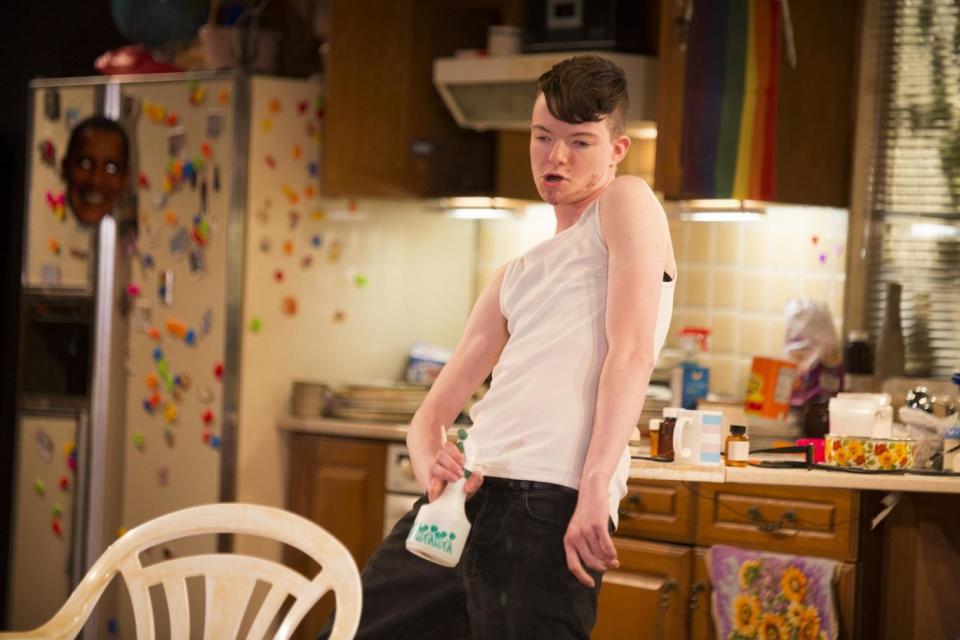Summer in London is the trans play actually being told by transgender actors

"It’s what I do. I waste time. I wasted an entire childhood pretending to be someone else… She (My mother) doesn’t know this girl. This woman. This daughter that she never painted the nursery for. All she sees is failure."
The words of Justine (Emma Frankland), loveable and hardened sandwich-seller from Rikki Beadle-Blair’s latest play, Summer in London. The show, heart-wrenching at times, is also full of comedy and admiration for the often overlooked beauty of London. It tells the importance of friendship and brotherhood, especially in difficult times.
It’s also the first play in the UK to feature an entirely trans cast, a massive achievement in itself in a climate where trans stories are rarely told on stage, on screen or in our history books.
It was enjoyable to watch characters who were written as humans first – the fact that any of them was trans was just a part of their identities and not the focus of the play.
Summer In London tells the comical efforts of four homeless men trying to impress their “ideal woman”, who in reality is much more similar to them than they can see. It features queer relationships and brings light to the fact that a quarter of homeless people in the UK are LGBT. Although some jokes were slightly distasteful, the characters were charming and relatable and the performances endearing throughout. It was also enjoyable to watch characters who were written as humans first – the fact that any of them was trans was just a part of their identities and not the focus of the play. In fact the word “transgender” was not mentioned once, and it was refreshing to see trans people having their own storylines outside the “trans narrative”, messing around, going on dates and enjoying a heat wave in the city.
And it's not just Summer in London, this Pride month there have been plays across London featuring trans performers and stories. One such play, Hir, written by renowned New York playwright and artist Taylor Mac, was not such comfortable viewing. It is based on an army veteran’s return to a small US town to find that the gender roles in his house have been reversed, so that his mother holds the power and authority and his father, having suffered a stroke, is treated as her house pet. Crucially, the mother having once been abused becomes the abuser, and this is incredibly difficult to watch.

The play’s sole trans character, Teddy Ferrara, played by trans actor Griffyn Gilligan, also exists to disrupt the binary ideas of gender. I felt in some places like ze (Teddy’s preferred gender pronoun, used in place of he or she) was written into the play simply as a plot tool to talk about gender, rather than a person with their own story and experiences. The script felt like it was poking fun at being trans and ridiculing pronouns that sit outside of the binary. As someone who identifies as transgender and uses they/them pronouns, I found the dialogue to be very triggering, and I didn’t enjoy trans identity being used as a laughing stock. Of all the characters in the play, young, straight, cis marine Isaac (Arthur Darvill) was supposed to provide the voice of reason in amongst other characters who were presented as confused and delusional, including Teddy for identifying as trans.
This is similar, though not quite as pronounced, in Jon Brittain’s Rotterdam. The straight, cis brother, Josh (Ed Eales-White), is once again a voice of reason, reacting supportively to main character Adrian’s (Anna Martine) news that he is a straight trans man rather than a lesbian woman. This is in comparison to Adrian’s girlfriend, Alice (Alice McCarthy), who completely freaks out, and Alice’s work mate, Lelani (Jessica Clark), who is outwardly transphobic. I also felt at times there was too much focus on the partner’s struggle with Adrian’s transition, rather than his own. Having said this, I cannot find any other faults with the play. It is an intimate and interesting exploration of a topic that isn’t given enough attention – trans identity and transitioning. It is beautifully acted, with moments of warmth and difficulty, and the characters are captivating, particularly Adrian, who presents all the anguish and power of being trans in an incredibly emotive and human way.

Unlike Hir, Rotterdam’s narrative made me feel proud to be trans, and I identified with the loss as well as the determination of the main character. I wish they had cast a trans character to play the main role, and considering how underrepresented trans people are in theatre, it doesn’t make sense to me that a cis actor was cast as Adrian, no matter how gifted an actor she is. However I thought overall the play was well thought out and very beautiful.
“You really want to become a man?”
“No Alice, I just want to stop trying to be a woman.”
I think trans theatre has a lot to learn from Summer In London, casting trans people to play trans roles. But I also think that just because trans actors are in trans roles, such as in Hir, it doesn’t suddenly make the play brilliant on trans issues. As seen in Rotterdam, a non-trans actor in a trans role can still perform it well, but it’s a shame not to take opportunities to nurture trans talent when they come up. Perhaps what we need is more trans writers, or simply more trans people to be cast in roles for trans or cis characters.
Summer in London is on at Theatre Royal Stratford East until Saturday 29 July


